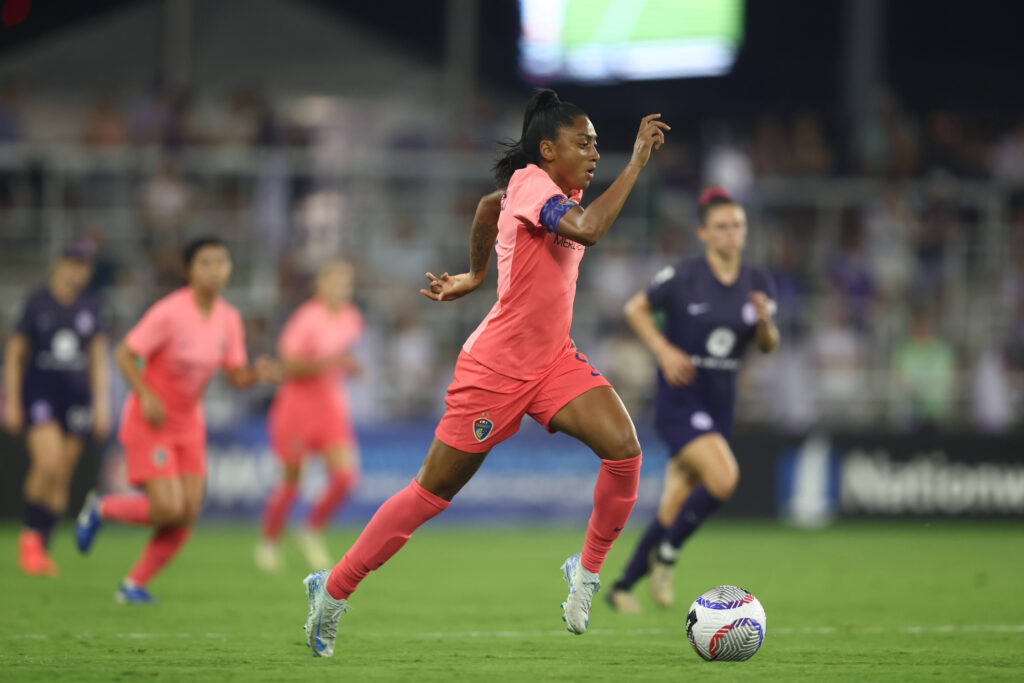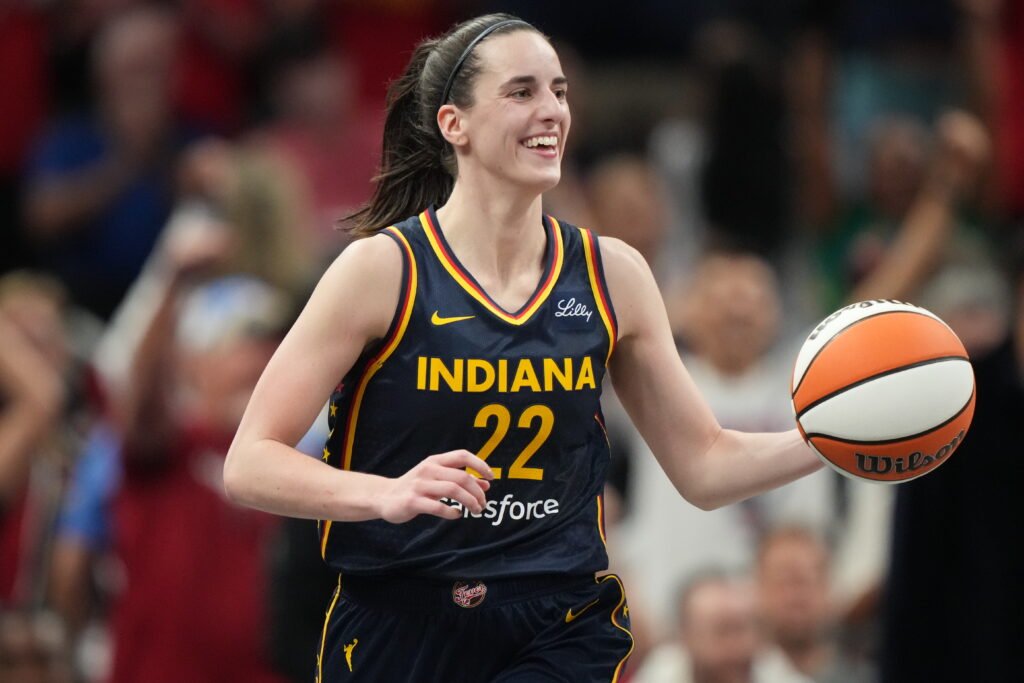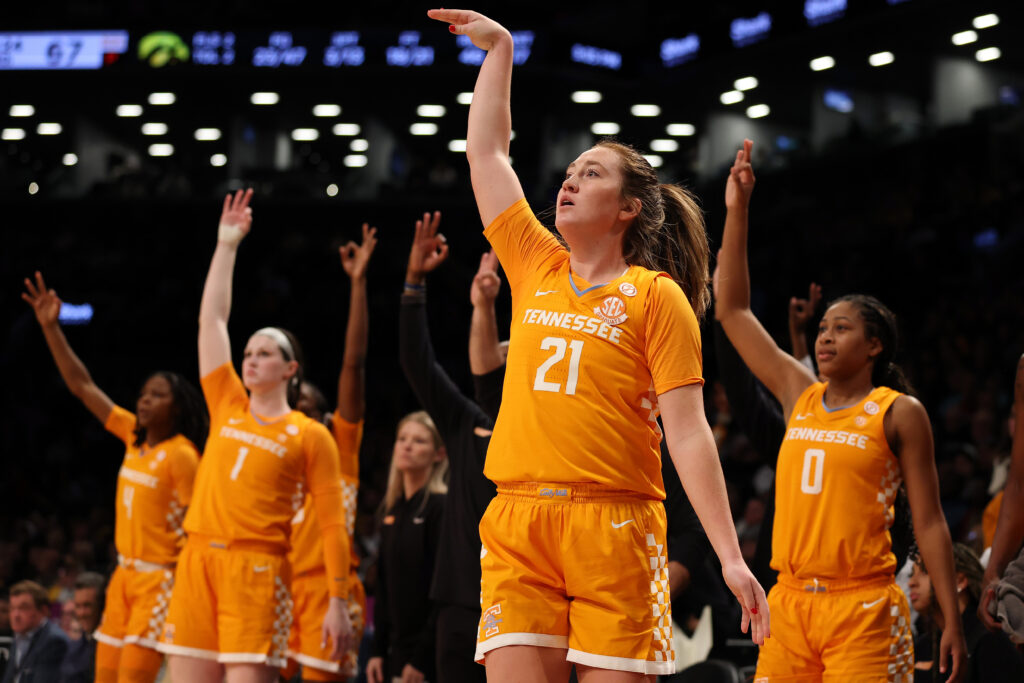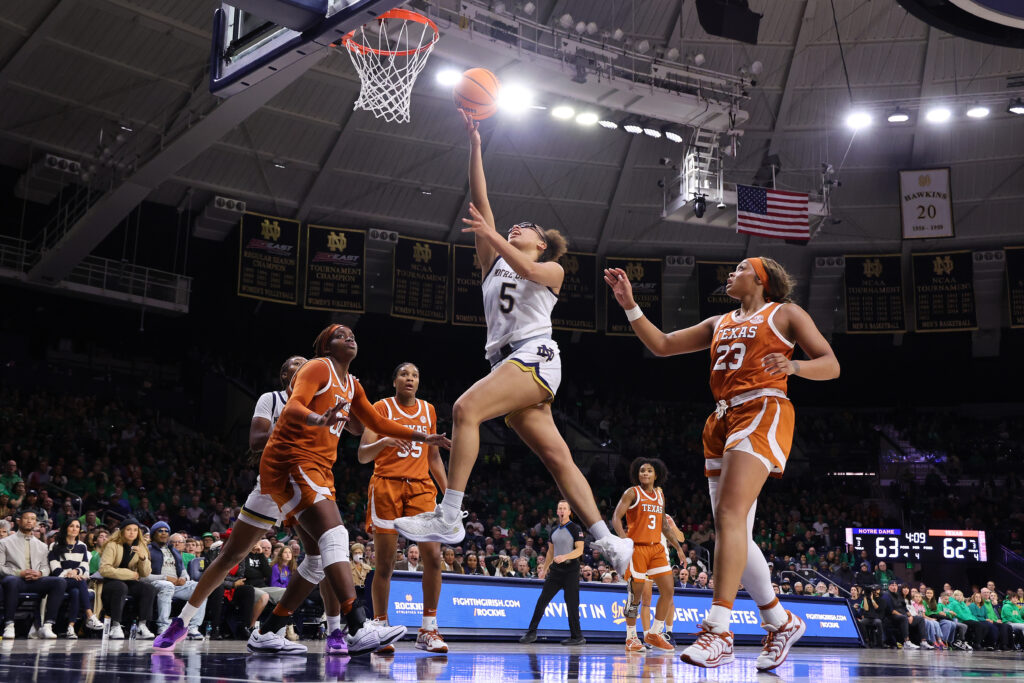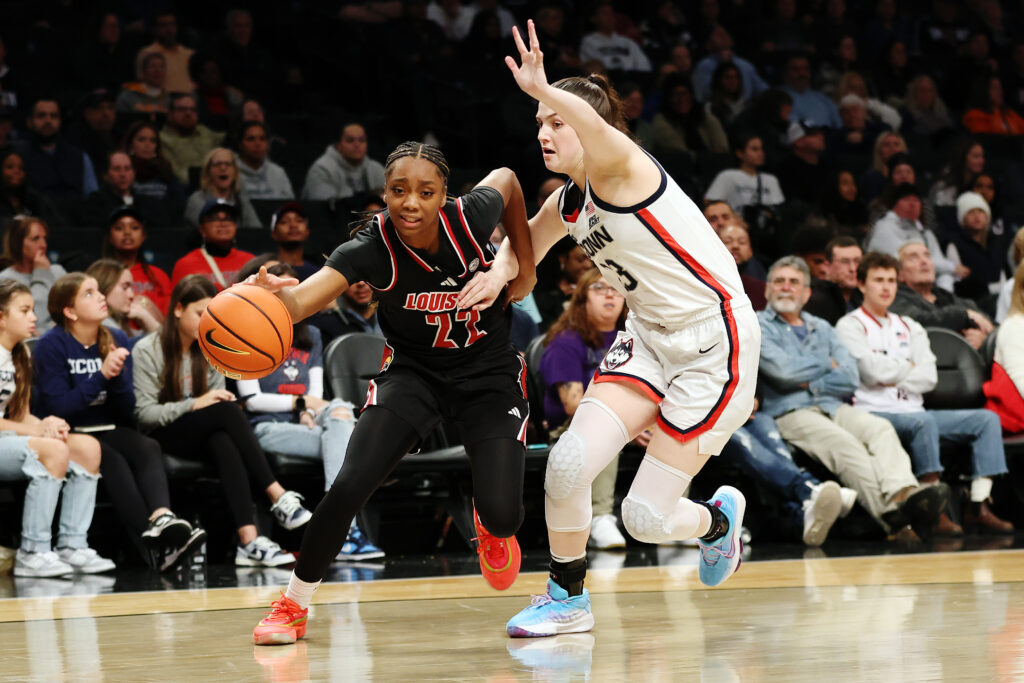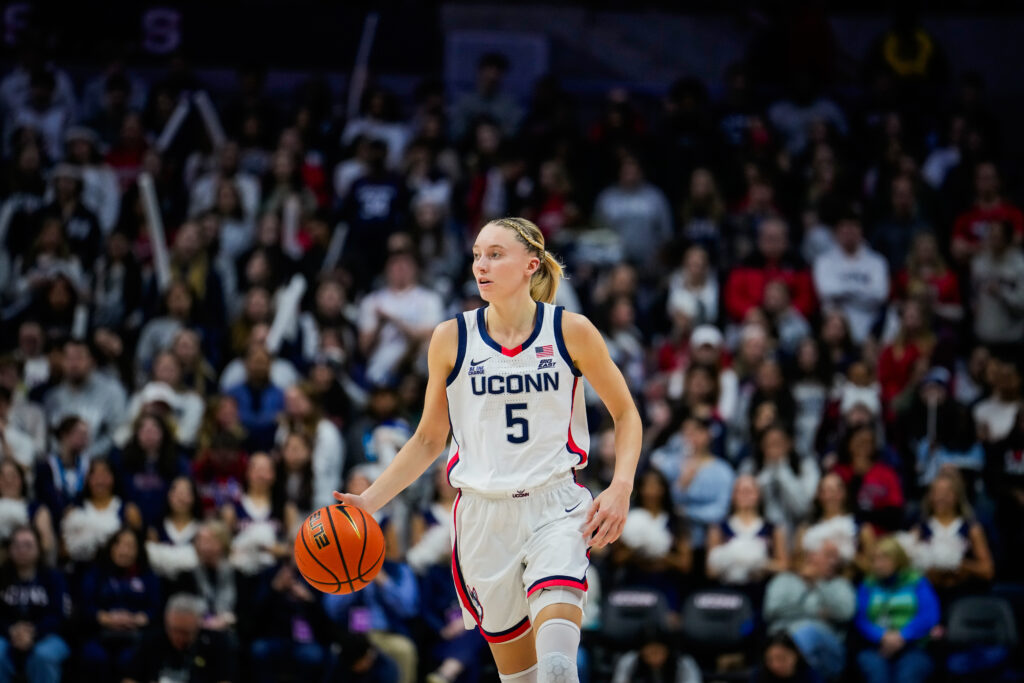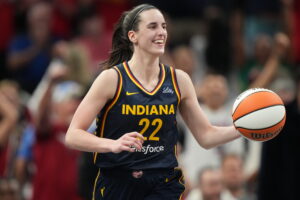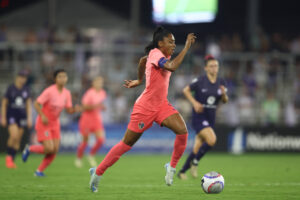Dominque Dawes is Olympic greatness personified as the winner of four medals across three Summer Games, so it’s no surprise the 45-year-old was tuned into the Beijing Winter Olympics this month.
Speed skater Erin Jackson, in particular, captured the gymnastics icon’s attention after putting on a dominant performance to become the first Black woman to take home a speed-skating medal in Olympic history.
“I was definitely excited for that amazing feat because I know it’s going to motivate a number of young girls of color to see speed skating as an opportunity for them,” Dawes told Just Women’s Sports.
Dawes is familiar with making history, having changed the landscape of her sport in 1996 when she became the first Black woman to win an individual Olympic medal in gymnastics. The Maryland native was also part of the “Magnificent Seven,” the first American group to win the gymnastics team competition when they came in first at the Atlanta Games.
“It’s not something I definitely stay fixated on,” Dawes says of her groundbreaking achievement. “It does warm and touches my heart when people bring up the Olympic feats and the fact that they watched those Olympic Games with a loved one and the fond memories that they still hold onto, and many times that loved one is no longer here.”
Although those Games are now 26 years in the rearview mirror, Dawes can still recall being overcome with emotion before she entered the Georgia Dome for the first time.
“It’s unlike anything I’ve experienced in life, the enormous amount of pressure,” she says. “Something that Simone Biles talked about was having the weight of the world on her shoulders, and that’s really what it felt like to be one of the leaders of Magnificent Seven for the ’96 Olympic Games.
“I had an emotional breakdown because it was so much pressure, and the weight that I felt emotionally as well as mentally that I was not only representing my country, but I was also representing my race.”
Dawes cites her teammates as her grounding force amid the stress, a feeling to which many Olympians and athletes can relate.
Mikaela Shiffrin made headlines during the Beijing Olympics after skiing out of three races, including her two best events, the slalom and the giant slalom. While onlookers searched for answers about what could have happened to the remarkably consistent skier, a welcome conversation emerged about athlete pressure, mental health and the dangers of the pursuit of perfection.
“The fans really just see everything that is on center stage, in the spotlight, when you get to the Olympic Games. They don’t know the journey, they don’t know the blood, sweat and tears, they don’t know the sacrifice,” Dawes says “They don’t recognize that you’re a human and you’re dealing with loss, and you’re dealing with pain, and you’re dealing with all the different emotions that come with just life, and that you’re also sacrificing so much to make it to the Olympics.”
Dawes started her Olympic journey at 6 years old and made her first team at 15, meaning her four-minute shot at glory was nine years in the making. The immense weight of that moment, when athletes are expected to execute on all the skills they spent preparing, can be daunting and debilitating.
“That’s what I love about the dialogue that’s happening today about mental health,” Dawes says, “because it’s OK for our young people and young adults to recognize that they need to put their mental health first.”

Dawes was outspoken about the stress of competitive gymnastics in the Peacock Series “Golden.” The six-part docuseries, which Dawes helped produce, follows five elite American gymnasts on their paths to the Tokyo Olympics, including all-around champion Sunisa Lee.
More than anything, the Tokyo Games will be remembered for an unprecedented move by star Simone Biles. The American gymnast and seven-time Olympic medalist stepped back from a series of events following a sudden onset of the “twisties,” sparking widespread acknowledgement of athletes’ mental health.
“I think it’s great that she was able to listen to her inner voice and do what was best for her,” Dawes says of Biles, penning a Washington Post op-ed in July in support of the young star’s stance.
While pressure is not unique to gymnastics, Dawes is adamant that the culture in the sport must change.
USA Gymnastics has been under intense scrutiny for years over its handling of the Larry Nassar sex abuse scandal. The former USAG team doctor was convicted of sexually assaulting minors in 2018, among other charges, with at least 265 young women and girls, many of whom are gymnasts, alleging abuse.
Béla Károlyi and Márta Károlyi, who were at the helm when Nassar was on Team USA’s staff, have also been criticized for their negligence and reportedly abusive coaching techniques.
“I think there needs to be an overhaul of those that are out on the floor currently coaching that are detrimental to the overall health and well-being to these young girls and these young women that are on the floor,” Dawes says.
Gymnasts like Ali Raisman and Biles have been outspoken about their disillusionment with USA Gymnastics’ commitment to athlete safety and have repeatedly demanded change. Dawes says the right people still aren’t in positions of power, despite the athletes’ objections.
“I believe the way we can save our sport is by getting the right coaches in there, and currently, we don’t have them on the national level, in my opinion,” Dawes says.
She is also careful to point out that abuse isn’t unique to USAG, but a problem in private gyms as well. Dawes has been vocal about the toxic environment she trained in under her personal coach, and that the neglect she suffered is something she still carries with her today.
“I went through years of anxiety. I was terrified each and every morning going to practice. I would cry all the time, I was hyperventilating quite a bit,” says Dawes, who felt at the time that she didn’t have the choice of leaving the gym or the sport. Those who did walk away from gymnastics were ostracized and targeted for their changing bodies, she says.
“It made young people feel shameful about going through puberty, about growing up, about becoming a young woman,” says Dawes. “And that’s sad because it really does damage. It wrecks a young person’s self-esteem and self-worth.”
The culture that continues to plague gymnastics is why Dawes has stuck with the sport, opening the Dominique Dawes Gymnastics & Ninja Academy with her husband in an effort to reform gymnastics from the inside.
“I don’t want my poor kids to experience what I experienced,” she says. “It’s a beautiful sport, and it can be done the right way with the right people. We want to offer a positive, empowering and encouraging environment for young girls that want to pursue the sport of gymnastics.”
Dawes has plans to to expand her gym in Clarksburg, Md. in the fall of 2022, and perhaps more beyond that. She finds comfort in the fact that the pain she underwent years ago can now serve a greater purpose.
“That’s what drives me today, is I don’t want today’s generation or tomorrow’s generation to go through what I went through,” Dawes says. “I’m doing it today because I am standing up for the young Dominique.”
Golden is available to stream now, as Peacock honors Black History Month this February by spotlighting content from Black creators and about the Black experience.
Clare Brennan is an associate editor at Just Women’s Sports.

